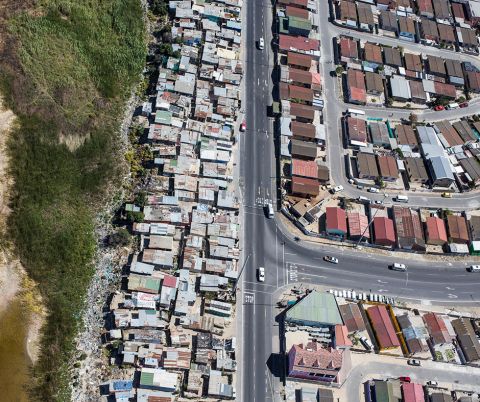Energy Transition During Energy Crisis: Cape Town's Experience (2024-2025)
Background
At the 26th Conference of Parties (COP26) in Glasgow, the government of South Africa made a historic commitment with a multi-government International Partners Group to create the first Just Energy Transition Partnership (JETP). The South Africa JETP is meant to grapple with the unique challenges of decarbonizing South Africa's fossil fuel-dependent economy. The commitment of the partners to enable a “just transition” is the distinguishing feature of the JETP, which recognizes the direct and indirect impact that energy transition has on livelihoods, workers and communities. The International Partners Group pledged $8.5 billion U.S. dollars over the initial period to support the realization of a low-carbon future in line with South Africa's most ambitious Nationally Determined Contribution commitments.
Meanwhile, South Africa is grappling with an unprecedented and worsening power crisis, brought on by a complex combination of aging infrastructure, poor maintenance and governance, criminal corruption and unprecedented levels of demand. The consequence has been regular, widespread loadshedding (i.e., power outages or redistribution to relieve stress on energy sources) that harms productivity, decreases household well-being and has contributed to capital flight and deindustrialization. This situation creates substantial risk and opportunity for the decarbonization agenda. Many incorrectly perceive that energy transition is contributing to the crisis, even as the shift to renewable energy generation is accelerating. Whether JETP opportunities are sufficient and justly distributed remains an open question.
Project Description
This project team will seek to understand the justice implications of energy transition during energy crisis as experienced in Cape Town, South Africa. Cape Town is a microcosm for the wider inequalities facing the country with a wide gulf separating wealthy and impoverished areas. These play out in a dramatic way as households and firms in the former areas move quickly to adopt rooftop solar to cope, incentivized by net metering, even as many low-income townships bear heavier loadshedding burdens and cannot make the same upfront investments.
Project team members will document unequal burdens by coupling new data analytics and modeling approaches, propose policy solutions that might decrease energy poverty inequalities, support JETP-related decision-making, and leverage the tools developed to evaluate the distributional impacts of these solutions.
Team members will work to detect distributed solar generation capacity in Cape Town using deep learning processing of aerial imagery. Several constituencies in Cape Town have noted that such data would open many potential avenues for applied research, but current capacities are lacking to develop it. The team will build on methods developed in the Duke Energy Data Analytics group to analyze the high-resolution aerial imagery available from the city. A doctoral student working on the project will travel to Cape Town to link the aerial imagery detection work with the energy consumption datasets available from the city, and to coordinate with the University of Cape Town Energy Systems Research Group.
Team members will learn about the policy context of the energy crisis in South Africa and the global rationale for JETP projects, engaging with researchers and guest speakers from South Africa. Subteams will work on the energy systems and econometric modeling components. Team members working on energy systems will incorporate new distributed generation potential into the energy systems models to understand its implications for meeting energy demands from the grid, and for considering policies solutions. Students working on econometric modeling will carry out econometric analysis of energy use patterns in the context of distributed solar generation adoption amid time-varying load-shedding to inform the modeling.
Anticipated Outputs
Geotagged datasets of rooftop solar installations; deidentified energy consumption data; research presentation; report
Student Opportunities
Ideally, this project team will include 5 graduate students and 5 undergraduate students interested in data science, statistics, engineering, modeling, environmental policy, economics, political economy, sociology and/or applied social science.
Students will learn how to integrate and leverage the capabilities of different types of energy and infrastructure modeling to pursue a coherent research design and agenda. Team members will think critically about the strengths and limitations of different approaches and will learn general energy system modeling and coding and build skills in empirical applications of economics. Team members will apply these skills to model an optimal energy system that informs econometric modeling. The team will consider the relationship between electricity access and inequality and potential policy solutions that take both into consideration.
In Fall 2024, this team will meet on Fridays from 10-11:15 a.m. Subteams will meet at least weekly in addition to whole team meetings.
See also the related Data+ project for Summer 2024; there is a separate application process for students who are interested in this optional summer component. A selected Ph.D. student will travel to Cape Town, South Africa.
Timing
Summer 2024 – Spring 2025
- Summer 2024 (optional): Data+ students: Develop deep learning algorithm for detection of rooftop and other solar installations in Cape Town
- Fall 2024: Seek IRB approval; hold project orientation; initiate team work on econometric, energy systems modeling and energy poverty and inequality concepts
- Spring 2025: Analyze concepts; develop project outputs
Crediting
Academic credit available for fall and spring semesters; summer funding available
See related Data+ summer project, Energy Transition During Energy Crisis: Cape Town's Experience (2024).
Image: Cape Town Aerial, by Mikael Colville-Andersen, licensed under CC BY 2.0

Team Leaders
- Marc Jeuland, Sanford School of Public Policy
- Liilnna Teji, Nicholas Institute for Energy, Environment and Sustainability
/graduate Team Members
-
Elizabeth (Biz) Yoder, Environmental Policy-PHD
/yfaculty/staff Team Members
-
Kyle Bradbury, Pratt School of Engineering-Electrical & Computer Engineering|Energy Initiative
-
Jackson Ewing, Nicholas Institute for Energy, Environment and Sustainability-Energy and Climate Policy
-
Dalia Patino Echeverri, Nicholas School of the Environment-Environmental Sciences and Policy
-
Jonathan Phillips, Nicholas Institute for Environmental Policy Solutions
